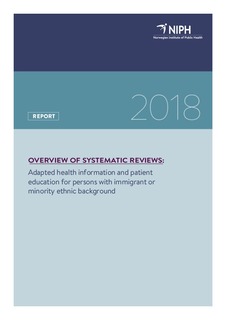| dc.contributor.author | Mosdøl, Annhild | |
| dc.contributor.author | Vist, Gunn Elisabeth | |
| dc.contributor.author | Straumann, Gyri Synnøve Hval | |
| dc.contributor.author | Spilker, Ragnhild Anne Caroline Storste | |
| dc.contributor.author | Austvoll-Dahlgren, Astrid | |
| dc.date.accessioned | 2019-01-24T08:52:30Z | |
| dc.date.available | 2019-01-24T08:52:30Z | |
| dc.date.created | 2019-01-09T15:53:48Z | |
| dc.date.issued | 2018 | |
| dc.identifier.isbn | 978-82-8082-984-9 | |
| dc.identifier.uri | http://hdl.handle.net/11250/2582087 | |
| dc.description.abstract | Key message
Health care services should be equitable for all. Some immigrant and minority ethnic groups struggle to use these services or adhere to self-treatment in an optimal way. Adapted health information and patient education may benefit these groups. This overview of systematic reviews summarises the effect of such adaptations.
We found high quality systematic reviews about diabetes education, asthma education and cancer screening information. These showed that adapted health information and patient education for immigrant and minority ethnic groups could entail a broad range of interventions of varying intensity. In some studies, the participants received a single culturally adapted education session. Other studies followed up the participants many times, giving them extra care and adapted resources over many months and years.
Most studies were with minority ethnic groups in the USA. Although the US health care system is different from the Norwegian, we consider these results relevant to immigrant and minority ethnic groups in Norway experiencing similar barriers and challenges in using the health care services. Based on the summarised evidence, the anticipated effects of adapted interventions compared to usual care are:
• Adapted diabetes education somewhat improves long-term blood sugar levels in patients. The evidence mainly comes from studies with highly intense interventions.
• Adapted asthma education may give some fewer severe asthmatic exacerbations among children, but the effect is unclear among adults. The evidence comes from studies with interventions of relatively low intensity.
Adapted interventions to promote cancer screening probably increase the number of women attending mammography. The evidence comes from interventions that often involved lay health workers and took place outside the health care sector. | |
| dc.language.iso | eng | |
| dc.publisher | Norwegian Institute of Public Health | |
| dc.relation.uri | https://www.fhi.no/globalassets/dokumenterfiler/rapporter/2018/adapted-health-information-for-persons-with-immigrant-background-rapport-2018.pdf | |
| dc.subject.mesh | Minority Groups | |
| dc.subject.mesh | Minority Health | |
| dc.subject.mesh | Emigration and Immigration | |
| dc.subject.mesh | Emigrants and Immigrants | |
| dc.subject.mesh | Health Education | |
| dc.subject.mesh | Patient Education as Topic | |
| dc.subject.mesh | Health Communication | |
| dc.subject.mesh | Health Literacy | |
| dc.subject.mesh | Systematic Reviews as Topic | |
| dc.title | Adapted health information and patient education for persons with immigrant or minority ethnic background | |
| dc.title.alternative | Tilpasset helseinformasjon og pasientopplæring for personer med innvandrer eller minoritetsetnisk bakgrunn: en oversikt over systematiske oversikter | |
| dc.type | Research report | |
| dc.description.version | publishedVersion | |
| dc.source.pagenumber | 46 | |
| dc.identifier.cristin | 1653533 | |
| cristin.unitcode | 7502,9,1,0 | |
| cristin.unitcode | 7502,9,5,1 | |
| cristin.unitname | Avdeling for vurdering av tiltak | |
| cristin.unitname | Formidling | |
| cristin.ispublished | true | |
| cristin.fulltext | original | |
